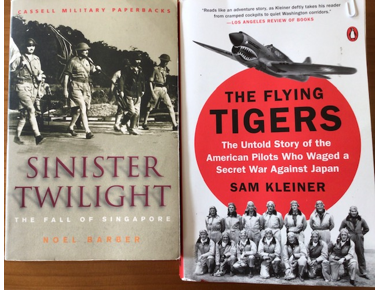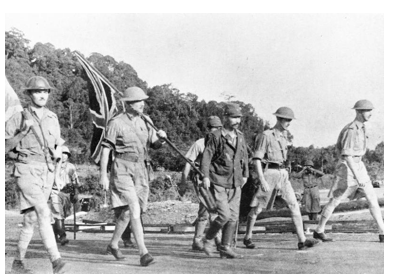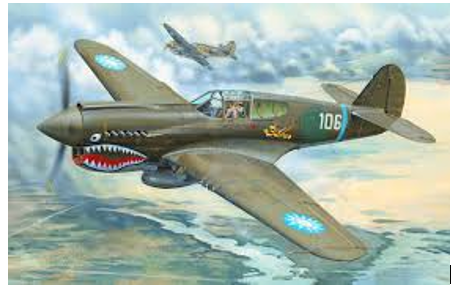Two Books, Two Backstories – By GEORGE BRAINE
I have recently finished reading two books, and this describes their special significance for me.

The fall of Singapore to the Japanese during WW II is the topic of Sinister Twilight, Noel Barber’s masterful account of Britain’s debacle. Inter-service rivalries, poor leadership, complacency, and just plain stupidity were the causes of Britain’s surrender within a week. (Churchill had called Singapore a “fortress”.) First published in 1968, the book is meticulously researched and written at a brisk pace.

At the end of the book, Barber states that the “Japanese victories in battle destroyed forever the legend of the white man’s supremacy”, paving the way for eventual independence throughout Asia.
Henry Colin Christy was a Captain in the Welsh Regiment stationed in Singapore, and was living there with his wife and infant daughter Jennifer. As the Japanese troops came sweeping down the Malay peninsula towards Singapore, wives and children of British soldiers and civil servants were evacuated to safer destinations. Jennifer and her mother travelled to South Africa on a British ship named “Empress of Japan”. The irony!
British forces in Singapore surrendered to the Japanese in February, 1942, and Captain Christy was sent north to work on the infamous death railway, which was later featured in the movie The Bridge on the River Kwai. He survived the horrendous conditions, but refused to eat rice for the rest of his life, recalling the miserable gruel he had been fed while slaving on the railway.
Jennifer and her husband were my good friends when I lived in Hong Kong. In June, I visited them in Victoria, Canada, where they live in retirement.

Sinister Twilight was gifted to me by Jennifer, and there lies its significance.
The second book, The Flying Tigers, is an account of the volunteer American airmen who fought on behalf of the Nationalists Chinese led by Chiang Kai-shek, against the Japanese, before America entered WW II. Based mainly in Kunming, in Yunnan Province, and led by the charismatic Claire Chennault, the Flying Tigers flew Curtiss P-40 single engine fighters. The aircrafts’ noses were painted to resemble a shark’s snout with bared teeth and a beady eye, giving the appearance that the plane was coming to eat you alive.

The Flying Tigers are credited with downing 299 Japanese aircraft, with another 153 “probably destroyed”.
When I was in graduate school in the United States, the first student from Mainland China enrolled in my program. Wei and I became friends and he told me the story of his family. They had been well off, and his father being fluent in English, had found employment with the Flying Tigers as an interpreter. When the Chinese Communists took over in 1948, Wei’s father was imprisoned because he had worked for the Americans. The family went into poverty, and Wei was sent to the countryside during the Cultural Revolution, and ordered to carry feces to the fields for fertilizer.
In the late 1970s, an American teacher named Barbara came to Wei’s hometown, and she befriended Wei’s family. Hearing the story of Wei’s father, who had died in prison, Barbara realized that he was owed a pension by the US government, and got a lawyer friend in the USA to work on the case. One day, out of the blue, a plain envelope arrived from the USA addressed to Wei’s widowed mother. Inside was a cheque for $50,000/, her husband’s accumulated pension and other payments. As an English teacher, Wei was earning the equivalent of $10 at that time, which goes to show what $50,000 meant to the family.
Thus, Wei could afford to enroll at an American university, and eventually find employment there. Not stopping at that, he managed to bring his ageing mother, some siblings, and even two nephews to America.
And that is my “link” to the Flying Tigers.
GEORGE BRAINE








